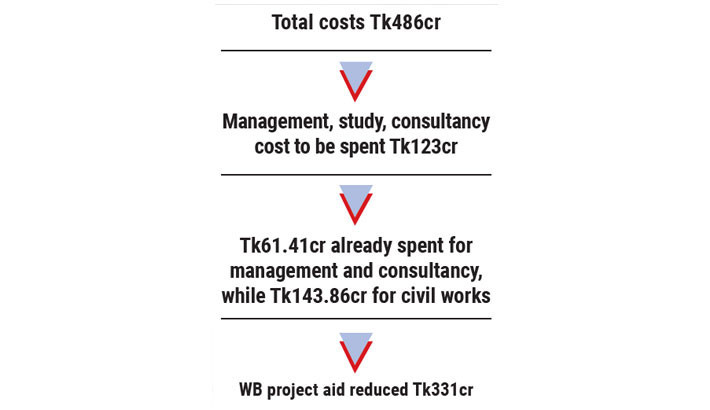
The Dhaka City Neighbourhood upgradation project has been heavily weighed down by consultancy and project management expenses, with almost 32% of the budget already spent on non-physical work while construction progresses at a snail’s pace.
The Dhaka South City Corporation (DSCC), which is implementing the project, has spent Tk205.27 crore over the last six years. Of this, Tk61.41 crore went into consultancy and project management, while Tk143.86 crore was spent on civil works and procurement.
According to the plan, DSCC intends to allocate Tk123.19 crore for management and consultancy and Tk361.66 crore for physical works and goods purchase, out of a total Tk484.86 crore, excluding contingency costs.
Experts have criticised the high consultancy spending, calling it “a luxury” when borrowed funds are being used. DSCC officials have also raised concerns over excessive spending on studies, supervision, monitoring, and external consultants.
Project progress reports up to June show that 32% of total expenditure was on consultancy and man-agement, with 68% on works and goods.
The Executive Committee of the National Economic Council (ECNEC) initially approved the project in 2019 at Tk880.46 crore, with completion set for June 2024. Later revisions cut the cost to Tk830.78 crore and extended the deadline to June 2025. DSCC has now sought an additional 11 months, pushing completion to May 2026, with a further budget reduction to Tk541.61 crore.
The project’s scope includes nine new community centres, one renovated community centre, a herit-age building, 7555 sqft of playgrounds, 3.5km of road widening, three solid waste transfer stations, and one footbridge.
Despite limited physical progress, 54% on the ground and 44.33% financially, DSCC has so far hired 11 consultancy firms. These include firms for project monitoring and evaluation costing Tk3.77 crore, su-pervision and quality assurance Tk3.70 crore, and strengthening revenue management Tk3.11 crore.
Other consultancy contracts include environmental and social safeguard services worth Tk2.25 crore and architectural and engineering design, supervision, and monitoring worth Tk40.07 crore, with an additional Tk8 crore required until 2026.
Nine individual consultants have also been engaged, including specialists in social safeguards and communication costing Tk 2 crore, environment Tk1.76 crore, urban design Tk1.62 crore, monitoring and evaluation Tk1.21 crore, procurement Tk1.68 crore, traffic signals Tk1.35 crore, and resettlement and gender Tk40.13 lakh.
The project has awarded 22 contracts, but none has been completed.
The improvement of Mosarraf Hossain Community Centre was awarded in June 2023 at Tk15.27 crore but has only progressed 64% despite revisions. The Dholaikhal Green Area and Pond project, awarded in February 2023 at Tk22.86 crore but reached only 71.08%.
Construction of secondary transfer stations in Kamrangir Char, Siddique Bazar, and Kalu Nagar has pro-gressed only 29% since starting in September 2022.
A senior DSCC engineer, seeking anonymity, said the World Bank-funded projects move slowly due to extensive layers of screening and approvals. “When a project naturally progresses at an ant’s pace, a consultant is appointed to review why it is slow—to make it slower,” he remarked.
He added that with so many consultants involved, contractors are unable to complete works without repeated plan changes. “Ultimately, no authority in Bangladesh can fully utilise loan money and com-plete the project,” he said, noting that less than half of the World Bank loan was effectively used.
Bangladesh Institute of Planners president Dr Adil Mohammed Khan said consultancy costs were unu-sually high.
“If Tk 123 crore is spent on project management and consultancy, what neighbourhoods will be up-graded? DSCC cannot afford such lavish consultancy on loan money when they already have engineers and staff,” he said.
He added, “If 5–10% of funds are spent on consultancy, supervision, and monitoring, that is tolerable. Spending more than 30% means the project is for hired firms and specialists, not the people.”
Contacted, DSCC Superintending Engineer and project director Rajib Khadem said the consultancy con-tracts were required under the World Bank loan conditions. “It was not solely the decision of the pro-ject authority,” he said.
Ishita Alam Abone, World Bank’s urban development specialist and project coordinator, requested Daily Sun to send the questions via email. The reporter sent the mail in May this year but had not re-ceived any response to that ever since.
The reporter can be reached at [email protected]


